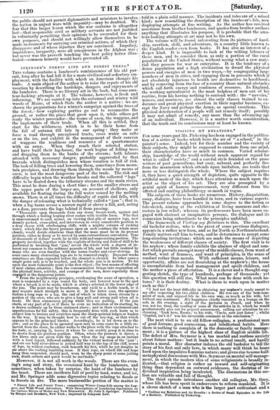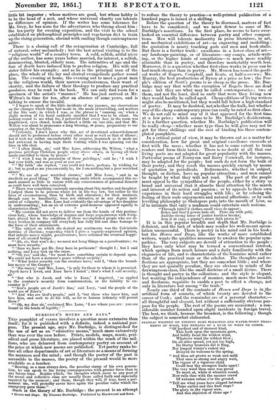Y
FOR some years past Mr. Pickering has been engaged in the publica of waggons the readiness and resources of a quartermaster - tion of ,a series of books which have the air of " a school," in the with an army. When they reach their selected station,
painter s sense. Indeed, but for their number and the variety of their subjects, they might be supposed to emanate from one mind, and have built their log-house, the work begins of felling trees their characteristics have so much in common. Varied scholar- attended and dragging them to the banks of the stream; both labours ship, knowledge of the world without much apparent regard for attended with necessary danger, probably aggravated by that
bravado which distinguishes men whose vocation is full what is called "society," and a careful style founded on the prose writers of past generations, but easy, na-tural, and perfectly free The task of felling trees and lowering them, sometimes from moun-
from the mannerism which attends upon imitation, are traits that thin precipices, and drawing them through the woods by means of more or less distinguish the whole. Where the subject requires oxen, is not the most dangerous part of the trade. The risk and difficulty begin when the weather breaks and the collected " logs " , it, they have a quiet strength of depiction, quite opposite to the artificial mode of the day, which fixes attention as much upon the artist as the object of his art. They are also prompted by a spirit of human improvement, very different from the affected and canting philanthropy so much in vogue. The subjects of these books are numerous. History, disquisition, essay, dialogue, have been handled in turn, and in various aspects. The present volume approaches in some degree to the fiction or tale-sketch, aiming at the exhibition of living manners and cha- racters in low relief; whereas its predecessors have been more en- gaged with abstract or imaginative persons, the dialogue and its connexion being subordinate to the principles unfolded.
The framework of Visiting my Relations is this. The excellent old bachelor recluse, who is the pivot of some previous dialogues, appears in a rather new form, and as far North as Northumberland. Family matters call him to town, and he determines to accept some long-standing invitations; which are made the means of depictina- the weaknesses of different classes of society. The first visit is ;Do his nephew ; whose family exhibits the absence of object and com- fort which prevails amongst many of the middle classes, from want of method, want of firmness, and wantof principles, in the sense of conduct rather than morals. With sufficient means, leisure, and opportunity, affairs are not flourishing at the nephew's ; the house is uncomfortable from bad management and spoilt children, and the mother a piece of affectation. It is a clever and a thought-sug- gesting sketch, the type of hundreds, perhaps of thousands : yet this question will still rise, What more can be done with such na- tures? it is their destiny. What is there to work upon in matter such as this ?
"I had not the least difficulty in obtaining my-nephew's ready assent to my offer respecting his two eldest children. He was one of the best-tem- pered of men, and enjoyed life in his own way, as much as his wife, but without any sentiment. His happiness chiefly consisted in a lounge on the sofa in the evening, a sight of the pictures in _Punch, and when he was not too tired, the reading of some of the articles in it, which be would goodnaturedly give out for general amusement, calling our attention by ex- claiming' 'Look here, Emma,' to his wife, 'Uncle, now just listen' ; whilst 'Capital, isn't it?' was his invariable comment at the conclusion."
The next visit is to an old fellow-collegian, a professional man of good fortune, good connexions, and intellectual habits. Here there is nothing to complain of in the domestic or family manage- ment; it is a picture of the highest class of English middle life. The defect of Mrs. Seymour is a too morbid and restless anxiety about future matters : but it leads to no actual result, and hardly points a moral. Her character induces the old bachelor to tell the story of his first and only love, in which many will think he bears hard upon the impulsive feminine nature; and gives rise to some half- metaphysical discussions with Mrs. Seymour on mental self-manage- ment, in which the modern idea of some religionists is broadly in- dicated,—that religion is rather an inward and self-originating thing than dependent on outward evidences, the doctrine of in- dividual inspiration being inculcated. The discussions in this sec- tion are valuable and full of thought. The third episode introduces another old collegian, Mr. Grey, whose life has been spent in endeavours to reform mankind. It is a clever sketch of a man who is the larger part enthusiast and a • Visiting my Relations and its Results : a Series of Small Episodes In the Life of a Recluse. Published by Pickering.
little bit impostor ; whose motives are good, but whose hobby is to be the head of a sect, and whose universal charity can tolerate no difference of opinion. If the writer has some tolerance for Mr. Grey, he has none for the adventurers who throng about him : the tea-party for evening exposition, and the visit to the school established on philosophical principles and vegetarian diet to train up the rising generation, abound with smiling though contemptuous satire.
There is a closing call of the sexagenarian at Cambridge, full of natural, sober melancholy ; but the last actual visiting is to the "religious world" of a country town. A cold, selfish, artful niece of the author, has some years before married, for interest, a selfish, domineering, bloated, elderly man. The infirmities of age and the fear of death have induced him to profess religion. His wife and sister follow his example ; and as he is the principal man of the place, the whole of the lay and clerical evivagelicah gather round him. The evening at home, the evening out to meet a great man in the religious world, their narrow exclusiveness, their want of charity, and the failure of their theology to produce any practical goodness, may be read in the book. We can only find room for a specimen of the artist's "manner." He has just arrived at Mr. Wilton's in time for tea, after an absence of some years, and is talking to amuse the invalid.
"I began to speak of the little incidents of my journey, my observations on the changes which time had made in the mode of travelling, and matters
of the like• sort; in which I was, as the phrase is running on,' when a
slight motion of his hand suddenly signified that I was to be silent. On looking round to see what for' I perceived that every face in the room was
lengthened, eyes closed, heads inclined a little on one side, and that Mr. Wilton was about to pronounce a long blessing, or grace, preparatory to our engaging at the tea-table. Certainly, I don't know why this act of devotional acknowledgment should not be performed before every other meal as well as that of dinner; but it took me rather uncomfortably by surprise inasmuch as it made me feel awkward in having kept them waiting while I was spinning out the time in idle chat.
" I often think, sir,' said Mrs. Lane, addressing Mr. Wilton, 'what a precious privilege Christian people enjoy above others, in having all their meals sanctified to them by prayer.' * * * " ' I wish I was in possession of those privileges,' said he ; I wish I had your faith, and was as good as you are.'
" 'My faith' she replied, you could not have, perhaps, by wishing for it ; but as good as me you can easily be, for lam nothing but a poor wretched sinner.'
" We are all poor wretched sinners,' said Miss Lane, and in us dwelleth no good thing.' The simpering smile which accompanied this re- mark seemed as little in unison with any consciousness of personal demerit as could have well been conceived.
"There was something curiously amusing about this mother and daughter. I judged them to be persons whose lot in life was low, but rather by the force of circumstances, than by birth and education ; for their manners, though easy to familiarity, were not obtrusive, or in any degree indi- cative of vulgarity. Mrs. lane had evidently the advantage of her daughter in understanding; but an air of extreme good-humour appeared equally to characterize them."
"My caution did not serve to deliver me from the hands of this pertina- cious lady, whose knowledge of dogmas and large acquaintance with Scrip- ture, placed her in the condition of those accomplished people who are al- ways restless in company till everybody ha fully felt and done homage to the force of their attainments.
"The subject on which she desired my sentiments was the Calvinistic doctrine of election; respecting which I gave a vaguely-expressed opinion, that infinite mercy might, peradventure, have ordained the eventual happi- ness of all created beings. " sir, that won't do ; we must not hang things on a peradventure ; we must have security.' •
"'Sure we have got Mr. Grey here in petticoats !' thought I; but I said nothing, and Lucy took up the cause.
" 'Oh yes,' said she, we must have something certain to depend upon. We could not have a moment's peace without security.'
" What better security can the creature have,' said I, than the bound- less mercy of the Creator r "His mercy,'. said Mrs. Lane, is only for those to whom it is promised. ' Jacob have I loved, and Esau have I hated ' ; that's what I call security, " 'But who is Jacob, and who is Esau,' I inquired, as applied to the creature's security from condemnation, or his liability to en- counter it ?'
"'God's people are of Jacob's line,' said Lucy, and the people of the world are of Esau's.'
"'And who are God's people,' said I, 'but those who know him, and love him, and seek to do his will, as far as human infirmity will permit them ?'
" Oh, ray dear sir,' exclaimed Mrs. Lane, BM where you are : you are bound in the bonds of legality.'"



























 Previous page
Previous page